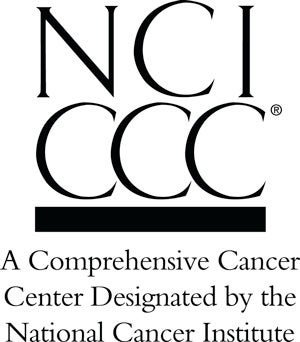Return to Think By Numbers, the 2012-2013 Annual Report
Collaboration among Case Western Reserve University, Cleveland Clinic and University Hospitals earns high praise from expert reviewers

 The center has held NCI designation for the past 25 years and attained the highest recognition—comprehensive status—in 1998. Case Western Reserve and University Hospitals served as the center’s original founders, and the Cleveland Clinic joined the initiative in 2003.
As part of the most recent renewal process, the three organizations adopted a formal set of governance and operating principles, and also codified their shared commitment to the center’s sustained success. The agreement proved so pioneering that the national team of experts twice emphasized its significance within their assessment. In particular, the experts commended the “exceptional” institutional support from the participating institutions, as well as the partnership’s implications for the future.
“With the ‘Memorandum of Understanding’ (MOU) in hand, “ assessors wrote, “the Center is now much better positioned to take full advantage of the consortium partnership.”
All told, Cleveland Clinic and University Hospitals Seidman Cancer Center treat nearly 10,000 new cancer patients each year. The presence of the CCCC allows all of these individuals the opportunity to participate in clinical trials and otherwise benefit from the concentration of expertise within the three organizations. Typically, almost 3,000 patients annually participate in some form of center-related research.
In addition, the participating institutions attracted more than $115 million in cancer-related research in 2012. The MOU emphasizes the center’s role as the leading coordinating body for this research, as well as the primary authority of director Stanton Gerson, in all of the center’s operations, initiatives and appointments.
“As the evaluation team noted, we have an exceptional leader who has steered the center to impressive growth and impact since he became director in 2004,” said Pamela B. Davis, dean of the School of Medicine and vice president for medical affairs. “We look forward to even greater progress in the years to come.”
Among the center’s most noteworthy achievements over the most recent five-year review period are:
The center has held NCI designation for the past 25 years and attained the highest recognition—comprehensive status—in 1998. Case Western Reserve and University Hospitals served as the center’s original founders, and the Cleveland Clinic joined the initiative in 2003.
As part of the most recent renewal process, the three organizations adopted a formal set of governance and operating principles, and also codified their shared commitment to the center’s sustained success. The agreement proved so pioneering that the national team of experts twice emphasized its significance within their assessment. In particular, the experts commended the “exceptional” institutional support from the participating institutions, as well as the partnership’s implications for the future.
“With the ‘Memorandum of Understanding’ (MOU) in hand, “ assessors wrote, “the Center is now much better positioned to take full advantage of the consortium partnership.”
All told, Cleveland Clinic and University Hospitals Seidman Cancer Center treat nearly 10,000 new cancer patients each year. The presence of the CCCC allows all of these individuals the opportunity to participate in clinical trials and otherwise benefit from the concentration of expertise within the three organizations. Typically, almost 3,000 patients annually participate in some form of center-related research.
In addition, the participating institutions attracted more than $115 million in cancer-related research in 2012. The MOU emphasizes the center’s role as the leading coordinating body for this research, as well as the primary authority of director Stanton Gerson, in all of the center’s operations, initiatives and appointments.
“As the evaluation team noted, we have an exceptional leader who has steered the center to impressive growth and impact since he became director in 2004,” said Pamela B. Davis, dean of the School of Medicine and vice president for medical affairs. “We look forward to even greater progress in the years to come.”
Among the center’s most noteworthy achievements over the most recent five-year review period are:
$11.3 million SPORE (Specialized Program of Research Excellence) Grant in Gastrointestinal (GI) Cancers
- In 2011 Case Western Reserve became only the sixth institution in the country to win federal support for a center focused on preventing and treating cancers of the colon and esophagus. University Hospitals is a primary partner in this grant project.
Genetic Breakthroughs
Center members have demonstrated growing expertise regarding the role of genetic factors in the development of different forms of cancer—findings that, in turn, offer pathways to prevention and cures. A few of the more recent findings include:- In May, the company Genomic Health announced the release of a new, genetically based test to determine the degree of aggressiveness of a patient’s prostate cancer. Developed through research by center members, the test assigns patients a Genomic Prostate Score to help guide physicians in determining whether surgery or active surveillance represents a patient’s better option. The breakthrough promises to significantly reduce the rates of overtreatment for prostate cancer that today are as high as 90 percent.
- In May, researchers identified a key genetic abnormality that appears common to a broad range of cancers, including breast, colon, melanoma and others. The finding provides a new target that medications could attack early and thus stop potential tumor growth.
- In April, the National Cancer Institute began recruiting patients for a clinical trial of a drug that center researchers developed that blocks attempts to repair damaged DNA and thus makes cancerous cells more receptive to chemotherapy.
- In September 2012, researchers identified a gene that appears to suppress metastasis in breast cancer.
- In July 2012, the center’s research contributed to a massive colon cancer study published in Nature that is part of the national Cancer Genome Atlas Project. This study identified key genetic mutations that appear to be consistent among various colon cancer tumors—highlighting potential approaches to reverse the dangerous changes.
- In April 2012, researchers identified “master switches” that turn on and off genes whose changes are a key sign of colon cancer; the research also highlighted potential indicators of differing susceptibility to the disease.
Drug Development
- The center has made “home-grown” discoveries of potential therapeutics a priority of its work across multiple forms of cancer and research approaches. In 2012, for example, a center researcher found that two federally approved drugs could be combined to help reverse metastasis of lung cancer. In the same year, another center researcher reported promising findings regarding a potential “vaccine” for pancreatic cancer—one of the most deadly forms of the disease.
Imaging
- This spring, center researchers co-authored a landmark paper regarding a new approach to magnetic resonance imaging that could provide earlier identification of cancer as well as other diseases. So-called MRI fingerprinting would take place so quickly it conceivably could become part of patients’ annual physicals. The discovery is one of several pioneering discoveries that have emerged from this relatively new center emphasis; others include the use of gold nanoparticles to target therapies in brain tumors, and the development of optical imaging probes to help distinguish between cancerous and healthy tissue in lumpectomies.



